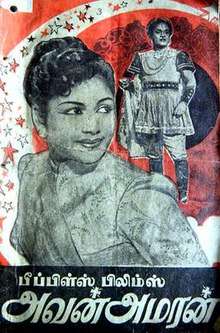Avan Amaran
Avan Amaran (transl. He is immortal) is a 1958 Indian Tamil language film produced and written by Nagercoil S. Nagarajan, and directed by S. Balachander. The film stars K. R. Ramasamy, P. Kannamba, Rajasulochana and T. S. Balaiah. It was released on 23 May 1958.
| Avan Amaran | |
|---|---|
 Poster | |
| Directed by | S. Balachander |
| Produced by | Nagercoil S. Nagarajan |
| Written by | Nagercoil S. Nagarajan |
| Starring | K. R. Ramasamy |
| Music by | T. M. Ibrahim |
| Cinematography | Nemai Ghosh |
Production company | People's Films |
Release date |
|
Running time | 199 minutes[1] |
| Country | India |
| Language | Tamil |
Plot
Cast
The cast is listed below:[2][3]
- K. R. Ramasamy as Arul
- P. Kannamba as Arul's mother
- Rajasulochana as Lily
- T. S. Balaiah as Lily's father
Production
Avan Amaran was produced and written by Nagercoil S. Nagarajan under People's Films, and directed by S. Balachander shot at the Newtone, Paramount, and Revathi studios in Chennai.[3][1] The scene where labourers protest on a bridge was shot at a bridge near Fort St. George, Madras (now Chennai).[4] Cinematography was handled by Nemai Ghosh.[1]
Soundtrack
The soundtrack was composed by T. M. Ibrahim. The lyrics were by A. Maruthakasi, Ku. Sa. Krishnamurthi, Kambadasan, Surabhi, Ku. Ma. Balasubramaniam and Kuyilan. Playback singers are C. S. Jayaraman, Seerkazhi Govindarajan, A. M. Rajah, Jikki and A. P. Komala.[5] The song "Kaalanaa Minjaadhaiyaa" is based on "Ramayya Vastavayya" from the Hindi film Shree 420 (1955), and "Vaanmadhi Nee Arivaai" is based on "Jaye To Jaye Kahaan" from another Hindi film, Taxi Driver (1954).[6]
| No. | Song | Singers | Lyricist | Length |
|---|---|---|---|---|
| 1 | Vaanmadhi Nee Arivaai | Seerkazhi Govindarajan & Jikki | Ku. Ma. Balasubramaniam | 03:34 |
| 2 | Kanmaniye Innamudhe Karkandu Paage | Jikki | Ku. Ma. Balasubramaniam | 03:01 |
| 3 | Ezhaiyai Kozhai Endru Ninaikkudhu | K. R. Ramaswamy | Ku. Sa. Krishnamoorthi | 02:22 |
| 4 | Varum Kaalam Ulagam Namadhendre | Jikki & group | A. Maruthakasi | 03:24 |
| 5 | Kaalanaa Minjaadhaiyaa Kaalanaa Minjaadhaiyaa | Seerkazhi Govindarajan, A. P. Komala & group | 03:14 | |
| 6 | Aniyaayam Indha Ulagile | C. S. Jayaraman | 04:12 | |
| 7 | Kanneer Sindhaadhe Kavalai Kollaadhe | Jikki | 03:11 | |
| 8 | Yezhaigal Vaazhvil .. Van Pasiyaale Thudikkiraar Inge | K. R. Ramaswamy | Kuyilan | |
| 9 | Aasiyaavin Jyothiyaaga | Group song | ||
| 10 | Kanavo Sol Kaadhal | K. R. Ramasamy & Jikki | Kambadasan | |
| 11 | Dhaam Dhoom Thagatham | A. M. Rajah & A. P. Komala | Surabhi |
Release and reception
Avan Amaran was released on 23 May 1958.[7] Film historian Randor Guy wrote that the film would be "Remembered for the leftist message-oriented story, screenplay and dialogue, the performances by Ramasami, Kannamba, Balaiah and Rajasulochana, and Balachandar's deft direction." According to him the film did not succeed commercially.[3]
References
- Rajadhyaksha & Willemen 1998, p. 353.
- Baskaran 1996, p. 123; Rajadhyaksha & Willemen 1998, p. 353.
- Guy, Randor (12 May 2012). "Avan Amaran 1958". The Hindu. Archived from the original on 23 January 2017. Retrieved 23 January 2017.
- Baskaran 1996, p. 123.
- Neelamegam, G. (December 2014). Thiraikalanjiyam — Part 1 (in Tamil) (First ed.). Chennai: Manivasagar Publishers. p. 137.
- Gopalakrishnan, P. V. (15 May 2017). "FIlmy Ripples- Inspired plagiarism in early music". The Cinema Resource Centre. Retrieved 7 March 2019.
- Film News Anandan (2004). Sadhanaigal Padaitha Thamizh Thiraipada Varalaru [Tamil film history and its achievements] (in Tamil). Chennai: Sivagami Publishers. Archived from the original on 21 April 2017.
Bibliography
- Baskaran, S. Theodore (1996). The eye of the serpent: an introduction to Tamil cinema. East West Books.CS1 maint: ref=harv (link)
- Rajadhyaksha, Ashish; Willemen, Paul, eds. (1998) [1994]. Encyclopaedia of Indian Cinema (PDF). Oxford University Press. ISBN 0-19-563579-5.CS1 maint: ref=harv (link)
External links
- Avan Amaran on IMDb